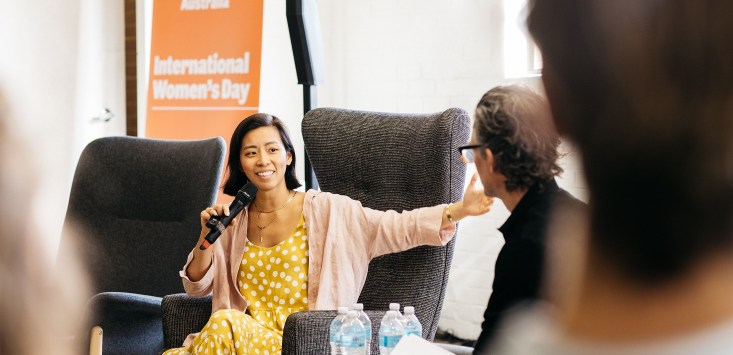
Kim Teo, co-founder and CEO of Mr Yum. Source: Skyline Creative.
Happy International Women’s Day 2023! The day/week/month gets more exciting every single year.
I acknowledge upfront that female founders/CEOs in technology is a very, very small subset of the global population of women whose successes are tremendously important and should be celebrated on IWD. I’m just sticking to what I know best.
Enabling, empowering female CEOs
My specific passion is to enable and empower female CEOs.
While relatively easy-to-find stats on the percentage of startups and investments made into companies with a female co-founder or female-only co-founding teams, it’s very hard to find data segmented by female CEO-led startups.
The reason this matters:
-
CEOs typically get paid more and have a bigger equity stake in the company than their co-founders. This isn’t always the case, but it is quite common.
-
The CEO is usually on the board of directors. Co-founders can also be on the board, but this isn’t always the case. The board of directors controls a private company.
-
The CEO is responsible for raising capital and investor relations. This is where the relationship with the board first begins, therefore there is leverage in this role.
-
When there is a founder dispute — which is the 2nd most common reason startups fail — it’s likely the CEO will have the support of the board to remain. While it’s not the nicest thing to talk about, it’s important to acknowledge.
-
The buck stops with the CEO.
With all the love and respect in the world to my co-founders and co-founders of startups, this is the way the system works. If we want to move the needle in a big way, we need to solve for increasing representation of female CEOs.
Having sat with this sentiment for many years, I’m choosing to speak up now because I have a potential solution to share rather than just highlighting yet another problem in our field.
This is a first iteration of putting early ideas into the world that will become refined over many more years — I’d love to hear from others who have spent time thinking about the same.
Learn to build, learn to sell
Being a founder is a challenging role because it requires individuals to be T-shaped.
A T-shaped person has a wide breadth of knowledge in many areas (the top of the T), and an expert in a small number of areas (the length of the T). In the early days of a startup, founding teams do a little bit of everything from sales and marketing, to product and strategy and operations – you rely on all parts of your T.
Of all these T-shaped skills though, I firmly believe that the two most important ones are building and selling.
If I had to rank them, start with a strong product vision and execute on that first, because a company with an amazing product will attract an awesome sales leader, and a great product and sales team will attract a great customer success team. It all starts with product.
Coincidentally, building and selling are often the skills where female participation is lacking, especially at the C-level. A few data points in the past three years indicate globally 85-90%+ of chief revenue officer, chief sales officers and chief commercial officer roles are filled by men. And we don’t need any new stats to remind us that participation of women in product and engineering is lacking.
When I left management consulting and corporate life, I had neither of these skills. With the patient coaching and relentless encouragement of my two male co-founders Adrian Osman and Andrei Miulescu, I learnt everything on the job. Adrian pretty much forced co-founder Kerry Osborn and I to learn to sell in an earlier business we had together, and Andrei spent countless hours answering my questions about “could we build this” and “how do we build that”. Today, we have a team of amazing growth and product folks that I continue to learn from daily.
For the first three-and-a-half years of Mr Yum, I worked in the product side of the business. I can’t write software but I really wish I could. I’m determined to learn one day. Nine months ago, Adrian, Kerry and I switched roles and now I am working in the growth team, while Adrian leads product and Kerry leads the US team. Our co-founder switcheroo has been awesome for us in gaining fresh perspectives and exercising our T-shaped muscles.
Even capital raising and M&A leverages sales skills in a big way. It’s a little more nuanced than an enterprise deal and I’ve found women are great at picking up on the subtleties — we can do it!
My strong advice to female entrepreneurs: learn to build, and learn to sell. It is so worth it. There is no silver bullet — surround yourself with great product, engineering and sales minds, ask them a ton of questions and give it a go.

Mr Yum co-founders Adrian Osman, Kim Teo, Kerry Osborn, Andrei Miulescu. Source: supplied.
Ignore the clickbait
Each year, there are some ugly stats revealed about VC investment into female-founded companies.
Last year, I heard only 2% of global VC capital deployed in 2022 went to women. The number shocked me so much I had to dig into it. It turns out the statistic referenced was only for solo founders who were female, which is a subset of companies with female founders. Expanding this out to companies with female founders, the number is 15%. The 2% headline is such clickbait.
Closer to home in Australia, 33% of pre-seed stage funding went to female co-founded companies in 2022, up from 21% the year before. This is a really important datapoint because early stage companies are the future of the ecosystem and it is also really difficult, nearly impossible, to change the ratio at Series C, D and E rounds because those companies were formed 5+ years ago.
Things are definitely improving in early stage capital allocation.
Maxine Minter has recently started the first pre-seed fund led by a female General Partner (GP), Co-Lab Ventures. GPs make the final decision on capital allocation. Kerry, Adrian and I are proud investors.
While these numbers are not perfect and there are still unconscious biases at play, we need to be careful about clickbait stats that create fear and imposter syndrome for women with big aspirations in technology.
The last thing we need is females approaching the fundraising process with a lack of confidence and lowering their expectations compared with male counterparts, or even worse, stepping back from leading a fundraising process because they believe the male co-founders will be more successful.
In my experience raising more than AU$100 million in capital for Mr Yum, I have not felt disadvantaged for being a female co-founder and CEO. VCs have been respectful, asked meaningful questions and any rejection we’ve had along the way has felt like it made commercial sense. Our VC investors are on Mr Yum’s Crunchbase if you’d like to find out who they are.
Believe you can do it, please ignore the clickbait.
We’ve got this
If we truly want to see women rise to the top in technology, we should be focused on increasing the representation of women in the CEO role by:
-
teaching them how to build and sell, so they become the obvious choice to lead as CEO
-
give them the confidence to think big and expect nothing less than male counterparts
-
support them through building a company in conjunction with a family (more on this topic next time).
We’ve got this!
Kim Teo is the co-founder and CEO of Mr Yum. This article was first published on LinkedIn.
Handpicked for you

My biggest mistake: Kim Teo, co-founder of Mr Yum



COMMENTS
SmartCompany is committed to hosting lively discussions. Help us keep the conversation useful, interesting and welcoming. We aim to publish comments quickly in the interest of promoting robust conversation, but we’re a small team and we deploy filters to protect against legal risk. Occasionally your comment may be held up while it is being reviewed, but we’re working as fast as we can to keep the conversation rolling.
The SmartCompany comment section is members-only content. Please subscribe to leave a comment.
The SmartCompany comment section is members-only content. Please login to leave a comment.